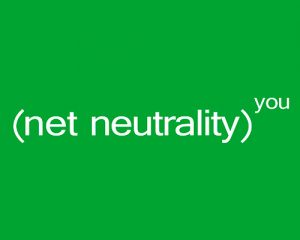 Tech policy geeks (myself included) in Washington were focused on network neutrality this week. That’s because last October, the Federal Communication Commission issued a set of proposed network neutrality rules and Thursday was the deadline for public comment. This is a good opportunity to talk about exactly what the FCC is up to and what it means for the real estate industry.
Tech policy geeks (myself included) in Washington were focused on network neutrality this week. That’s because last October, the Federal Communication Commission issued a set of proposed network neutrality rules and Thursday was the deadline for public comment. This is a good opportunity to talk about exactly what the FCC is up to and what it means for the real estate industry.
What the Heck is Net Neutrality?
The term network neutrality refers to the idea that internet service providers (phone, cable and now wireless phone companies) should not be allowed to block, degrade or discriminate against online content, services or applications on the web.
Sounds reasonable, right? That’s the way it works now isn’t it? Well not exactly. Today, network operators decide on their own whether to comply with voluntary net neutrality standards. The voluntary standards call for ISPs to allow subscribers to send and receive any lawful content, run any lawful applications and services, and to connect devices to their computers, laptops as long as those devices do not damage providers’ networks.
What is the FCC trying to do?
The FCC has proposed putting rules in place that would make these voluntary standards mandatory. The Commission is also proposing to expand the rules to require that network operators to treat lawful content, applications and services the same. In other words, IPS would be prohibited from giving preferential treatment to their own network traffic. This is called the “non-discrimination” principle. What’s more, the commission is considering whether to make operators disclose network management information so users can decide if they are getting the services they are paying for and to ensure operators are not manipulating their networks to favor their own services . This is the “transparency” principle. Finally, the FCC wants to make all of this apply to wireless broadband services. Today, wireless has no such rules—voluntary or otherwise.
Why Should You Care?
I don’t have to tell AG readers that the business of real estate is increasingly moving online. Here’s a paragraph I pulled from the comment letter NAR filed this week.
“The Internet has become an indispensible tool in the home buying and selling process. In fact, the 2009 NAR Profile of Homebuyers and Sellers found that one-third of homebuyers begin their property search by looking for properties online. For buyers under the age of 44, that figure jumps to half of all homebuyers. Ninety percent of all home buyers used the Internet to search for homes and ninety percent of sellers reported that their home was listed or advertised on the Internet. These statistics point out how essential the Internet is to consumers and the real estate industry. Realtors® are important Internet content providers to the home buying public. As a result, access to fast, efficient and cost effective internet service is critical to the real estate industry.”
NAR supports the FCC’s proposal to make network neutrality principles mandatory and to expand them to include all broadband services whether wireline or wireless. If you want to read the NAR comment letter you can find it here:
Thoughts?
Photo courtesy of Flickr by paltelegraph
Melanie is the Senior Technology Policy Representative at the National Association of Realtors. That means she lobbies Congress and Federal Agencies on technology policy issues of importance to the real estate industry. In her pre-NAR life Melanie has been a practicing attorney and a software start-up executive. Like any native Californian, Melanie loves good wine and bountiful farmers markets.










































Russell Shaw
January 15, 2010 at 3:58 pm
Melanie, This is a HUGE issue and I appreciate very much you posting this on AG! I was not well informed and had not followed anything on Net Neutrality – in fact, had NO idea what the fuss was over. Reading NAR’s position prompted me to do a Google search of the words, “net neutrality” as I became quite interested in WHO OPPOSES NET NEUTRALITY.
In my opinion, NAR is on the side of Angels on this one! Please continue to keep the pressure on winning and keep the membership informed on this very important issue.
Thank you!
Eric Bramlett
January 15, 2010 at 8:18 pm
Here’s a good visual of what the internet would look like without net neutrality:
https://culturekitchen.com/files/netneut_01.jpg
Ties right in with Russell’s point: Look at who opposes net neutrality.
Jason Stoddard
January 16, 2010 at 5:13 am
Be mindful of the destiny of the 17th Chinese dynasty: be careful what you wish for, because you just might get it.
I oppose net neutrality.
It is unfortunate few people advocating for [more] government intrusion are not better students of history. It’s also unfortunate that most people do not know their ass from their head when it comes to economics, generally, and the Keynesian tactics of Centralized planners and regulators, specifically.
If passed, ‘net neutrality’ will create an unnatural monopoly and hyper-inflate the cost of doing business for carriers… a cost they will pass on to the consumer. This has been the case in every single market a government has entered into and regulated since the dawn of time. Do you suspect this will be any different?
Further, ask yourself: who owns the asset-means of distribution on the Net? Do you? Does the government? In both cases, no. Thus, you have no MORAL right to enjoin what the business does, when, where, how and why. Last time I checked, most folks who owned thing were not fond of governmental bureaucrats meddling in how they conducted their business. Why is this any different? Do you think a carrier would inhibit the velocity of exchange? And if they did, how many service providers would line up to serve you?
In the case of ‘new neutrality’ (which as a federal objective, has been around for quite some time,) should it “pass”, in conjunction with other regulatory agencies, it will be the gateway to regulate and tax the internet . This would invariably stifle, if not quash, agile carriers/providers from entering the market to provide much needed innovation and competition to their larger counterparts–innovation and competition that ensures forward movement and a check and balance to the large carriers acting bigger than their proverbial britches.
Before closing, the market has a litany of mechanisms in place to self-regulate issues and challenges arising from ‘net neutrality.’ If you don’t believe me, I’d be happy to give you the email address and mobile number of the Time Warner Cable executive that proposed metered billing.
Towards creative fidelity,
JS
(PS I would be very interested to read data on AG readers that oppose proposed FCC net privacy regulations while advocating net neutrality, even if that data is a simple show of hands. (Actually, it would satisfy if Benn would publicly disclose his positions, here.) In the former case, complete hypocrisy.)
Eric Bramlett
January 16, 2010 at 10:24 am
By that standard, there is no moral right to regulate business in any way, shape, or form.
The net neutrality movement serves to legislate protections for what we already enjoy. To decide whether or not you support net neutrality, you only need to ask yourself one question, “Do you like the internet as it is?”
Jason Stoddard
January 16, 2010 at 9:17 pm
Eric,
It’s interesting that while you [rather weakly] clash one point of my argument, the remaining points stand. It is also interesting to note that you seemingly do not know (by virtue of the fact that you do not cite) that this “movement” is born from the likes of Blue Chips who wholly intend to use the FCC as a vehicle to garner more market share. Most if not all of the battles cries for ‘net neutrality’ emanated from IP addresses assigned to Microsoft, Google and Yahoo dating as far back as 2005. It is believed that many supposed free agents and concerned citizens paying forward the message of net neutrality are or were at one time, paid contractors.
re: “By that standard, there is no moral right to regulate business in any way, shape, or form.”
Precisely, unless of course, the entity, interest, or industry voluntarily agrees to be regulated. On the other hand, in this case, the moral argument is contingent on the definition of ownership. I contend that, technically, private ownership is extant if and only if a material good is not backed by debt. Under the current FIAT monetary system, one would be hard pressed to find such. Taking a less denotative legal approach, suffice it to say that your position is not only arbitrary and capricious, it forecloses (pun intended) on the self-determination of an entire industry. Is it fair and just to dictate the protocols of utilization on something that you do not own? If, in response, one says “yes,” how is this anything but nationalization?
The main issue is not a matter of bit discrimination, multiple tiers, or even denial-of-service; rather it is a fight over private property and who owns the hardware infrastructure spanning the continent. Unfortunately due in large part to State intervention throughout the past century, this is a somewhat vague and nebulous area with many seemingly gray regions. To your credit, I sympathize with you for your confusion.
re: “The net neutrality movement serves to legislate protections for what we already enjoy. To decide whether or not you support net neutrality, you only need to ask yourself one question, “Do you like the internet as it is?””
I laughed when I read this as I realized that you’re, no doubt, one helluva marketer; if and when I have a listing, you’re my first call.
But rather than pandering to your clever rhetorical sensibilities, and more to the point: Not unlike you, many proponents of net neutrality miss the forest for the proverbial trees when promoting what is in their words is, “the freedom of the internet” and what in my estimation technically amounts to the nationalization of networks. The real solution for reform is not yet another round of regulation or confiscation of private property, but rather it is the abolition of State machinations involved in the telecom industry and private industry as a whole. “Market intervention begets yet more market intervention: the State caused the problem in the first place, and is now called into action to “fix it.” It is a history of folly that has been studiously chronicled and its only cure is cold-turkey abstinence.”Government, generally, and federal regulatory agencies, specifically, under the hospices of the American Political tradition, are not designed to reassign ownership of any thing. Quite the contrary. In the case of the latter, it is even more insidious because regulatory agencies are not beholden to due process of law.
And to your last point, directly, if it ain’t broke, don’t fix it. After all, the guarantee you seek will not be a result of further regulation by the FCC… unless of course you believe the FCC invented to radio spectrum; in which case, I have some ocean front property in Arizona that needs a buyer.
Thomas A. B. Johnson
January 16, 2010 at 12:02 pm
Information wants to be free. That doesn’t mean that you can access it for free. The owners of the chokepoints will charge for access to free, and then take the money and buy more chokepoint from Congress with campaign contribution bribes. They spend a dollar on Congressman and get about $1000 back in tax breaks and government giveaways.
Sal Antsipenka
January 16, 2010 at 2:49 pm
Whatever happens business invariably will be moving more and more to internet, especially real estate. So regulating this shift is not going to help anyone and just create more red tape.
Eric Bramlett
January 16, 2010 at 10:23 pm
I chose to poke a rhetorical hole in the crux of your argument, and to point out the basis of your opinion. (Because it’s a moral argument, you believe my rebuttal is weak.) You are a strict free market zealot. According to you, the government should play no role in regulating industry, unless that industry allows itself to be regulated. I won’t bother to go into the many, many, many examples of disaster as a result of unregulated industry (I really don’t think it’s necessary.)
You imply that the FCC improperly (or maybe immorally) controls the radio spectrum. What would happen if there were no regulation, and the radio industry were controlled by whoever could build the most powerful broadcast antenna? Is that efficient or productive?
Net Neutrality is a simple movement to prevent internet providers from discriminating against specific sites or networks. The benefits to the consumer are great. The benefits to society as a whole are great. So great that, while providers have avoided discrimination (with a few exceptions) thus far, it deserves to be legislated & protected.
As Russell pointed out, look who opposes net neutrality. If Time Warner (who provides phone & internet service, and who strongly opposes net neutrality) were allowed to discriminate against specific connections do you think there’s a chance they may choose to disallow or upcharge for connections to VOIP services? It was only after much public pressure (and threat of litigation) that Apple approved the Skype app for the Iphone. They still haven’t approved the Google Voice app (which has similar features, with the addition of free text.) There are no approved tethering apps for android devices or the iphone. Bottom line, net neutrality spurs innovation – skype & VOIP are both great examples of that.
Lastly…Net Neutrality is reassignment of ownership? To make that leap in logic, you have to agree that any regulation is reassignment of ownership.
Eric Bramlett
January 16, 2010 at 10:47 pm
I apologize if the word “zealot” was too strong. You’re promoting an unfettered free market, and I couldn’t find the appropriate description.
Ruthmarie Hicks
January 17, 2010 at 2:57 pm
When any discussion of regulation – one has to ask the question: what would happen if there was NO regulation anywhere???? Is that a free market – or is that chaos? Free market cowboys need to recognize that there is no such thing as a totally free market or totally free ANYTHING. Advocating for such a system is advocating for anarchy. I do think the word “zealot” is appropriate in this case.
Btw, for those republicans who long for the Bush era – you should thank God Obama is in office because the FCC under Bush was being pressured to do away with net neutrality.
Jason Stoddard
April 7, 2010 at 2:50 pm
Eric, et al
How about that court ruling?
https://biggovernment.com/jlakely/2010/04/07/court-to-fcc-there-are-limits-to-your-power/
Remember, you can’t lobby a court of law, but you can petition and plead. In the latter case, the FCC’s jurisprudence does not hold water because there are limits to its authority.
free[er] markets 1
centralized planning and unnatural monopolies 0
Eric Bramlett
April 7, 2010 at 4:14 pm
Looks like it’s time to lobby congress!
Melanie Wyne
April 7, 2010 at 5:22 pm
This CNET article by Margeurite Reardon is a good overview of the questions being asked here in Washington and around the country in light of yesterday’s Comcast decision.
https://news.cnet.com/8301-30686_3-20001886-266.html?tag=newsEditorsPicksArea.0